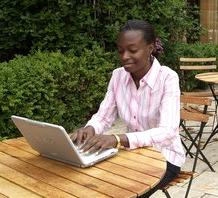University of Reading goes even greener – University of Reading
27 October 2009
A series of free fun and green events for students, staff and the local community will take place between 2nd and 6th November. The week carries a serious message too, and will aim to raise the profile of green issues on campus, as well as illustrate the ways a leading research-intensive reduces its environmental impact.
During the week, local residents can take a guided tour of the beautiful trees on the campus or take in a lunch-time concert. Professor Tim Wheeler will present a fascinating public lecture on climate change and global food security, while Geoff Mitchell will explain how we can start to recycle the unrecyclable in an informal talk and debate.
The newly-opened Hopkins Building, a state-of-the-art facility home to biomedical and pharmaceutical teaching and research, will open its doors to visitors. There will be an opportunity to tour the building followed by an update showcasing the University's green credentials and how they benefit the local community.
Thursday 5 November will be a no-car day for University of Reading staff and also see senior staff take place in the Low Carbon Challenge. Is it possible to get from Caversham to Henley without using a car? Our, rowers, cyclists, canoeists and bus users take up the challenge to find out which is the quickest way to travel from the heart of Reading to the University's Greenlands campus in Henley.
This year, the University formed its Environment, Energy and Sustainability Team (EEST). The team of four will focus on the management of energy, waste and transport and aim to coordinate environmental progress at the University.
"We hope the public will join us in celebrating Green Week," said Ian Cruickshank, the University's Environment and Sustainability Manager said: The creation of the EEST illustrates the University's ongoing commitment to take its environmental management extremely seriously. There are many ways in which we can reduce our environmental impact and by hosting Green Week we hope to showcase our environmental and sustainability performance to date, launch future green initiatives and highlight our future goals. For instance, by August 2012 we aim to divert half of our waste away from landfill and make 20% reductions in our carbon emissions by 2013."
RUSU are also holding many events during the week including the 'Make Plastic Look Fantastic' fashion show with recycled fancy dress, and a clothes swap. This year, students living in halls will be encouraged to take part in The Student Switch Off, where halls will compete against each other to come top of the class in energy efficiency.
RUSU President Sinead Brennen said: "Environmental campaigning is at the heart of RUSU and year on year we work to reduce both our and the University's carbon emissions. We are delighted to be working closely with the University to support Green Week. Student campaigners will be holding stalls and raising awareness of current environmental issues. We will also be recruiting student volunteer Eco-champions who aim to reduce the carbon emissions in their academic departments over the next year."
For more information on events taking place at the University during Green Week call Tom Yearley on 0118 378 4472 or visit www.reading.ac.uk/cleanandgreen
Ends
For all University of Reading media enquiries please contact James Barr, Press Officer tel. 0118 378 7115 or email j.w.barr@reading.ac.uk
University of Reading Clean & Green facts
Fairtrade status has been awarded to the University of Reading as of July 2008.
Over the past 3 years we have reduced our carbon emissions from 25,350 tonnes to 23,700 tonnes (a reduction of 6.5%) on energy consumption alone. That is the equivalent saving of filling Wembley Stadium seven and a half times over with CO2.
Since August 2007, 1,153 tonnes of waste collected from all University properties (excluding farms) of which we have successfully recycled 372 tonnes (32%). That is the equivalent of recycling the weight of 53 double decker buses a year.
100% of our energy on campus comes from green Hydro-Electric Power Stations. That is the equivalent of powering 11,300 houses a year, now through a renewable source.
In the last year over 48,000 m3 of water has been extracted from our bore hole, reducing reliance on mains water considerably. That is the equivalent saving of 192 Olympic size swimming pools saved.
• The University of Reading is rated as one of the top 200 universities in the world (THE-QS World Rankings 2009).
• The University of Reading is one of the UK's top research-intensive universities. The University is ranked in the top 20 UK higher education institutions in securing research council grants worth nearly £10 million from EPSRC, ESRC, MRC, NERC, AHRC and BBSRC. In the RAE 2008, over 87% of the university's research was deemed to be of international standing. Areas of particular research strength recognised include meteorology and climate change, typography and graphic design, archaeology, philosophy, food biosciences, construction management, real estate and planning, as well as law.
• Standards of teaching are excellent - the University scored highly in the National Student Survey 2009. 87% of Reading students responding to the survey stated they were satisfied with the quality of their course.
• The University is estimated to contribute £600 million to the local economy annually.
• University of Reading is a member of the 1994 Group of 19 leading research-intensive universities. The Group was established in 1994 to promote excellence in university research and teaching. Each member undertakes diverse and high-quality research, while ensuring excellent levels of teaching and student experience. www.1994group.ac.uk
More information at www.reading.ac.uk
